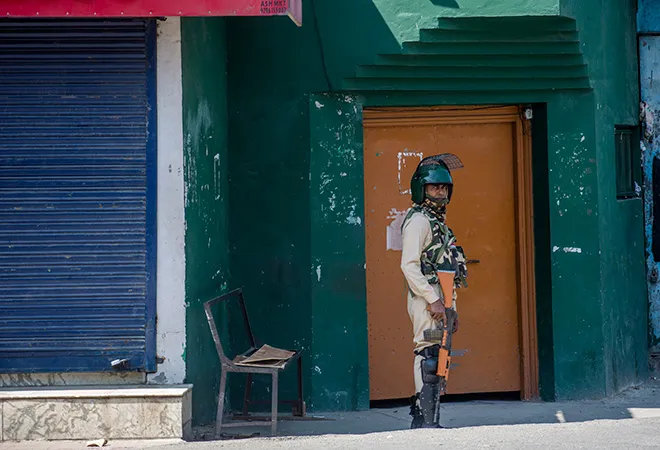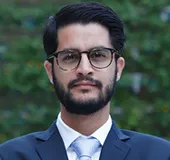
Nearly nine months after the de-operationalisation of Article 370, bifurcation, and down gradation of Jammu and Kashmir from a state of the Indian union to the status of a Union Territory, restrictions on internet services and detention of senior mainstream political leaders continue. While there is very little attention on Kashmir because of the ongoing pandemic, the government also appears to have given up claiming normalcy in Kashmir. However, nine months on, the continuation of some of the harsh measures brought in on the eve of 5 August smack of an utter lack of confidence on the part of the administration and those calling the shots in New Delhi. Worse, it betrays a disconnect with the ground situation in the Valley and indeed rest of the UT.
On 27 April, the J&K administration extended the restriction on high-speed internet. An order issued by the Principal Secretary Home stated that the restrictions “have been placed to curb uploading, downloading and circulation of provocative videos, guard against rumour-mongering/fake news, prevent the use of encrypted messaging and VOIP services for infiltration and coordinating terror activities.” This part of the order suggests that the restrictions will aid the government to stop the usage of services that are deemed detrimental by the government.
Nine months on, the continuation of some of the harsh measures brought in on the eve of 5 August smack of an utter lack of confidence on the part of the administration and those calling the shots in New Delhi.
Furthermore, the order states that there has been a “spurt in terrorist violence” with the formation of a new militant outfit and rise in infiltration attempt which (farcical as it gets) “heavily depend on the high-speed internet.” In the fourth point, the order claims that the public order has been maintained “due to gradual easing of restrictions on access to the internet.”
Firstly, to suggest that the high-speed internet is required for infiltration is something of a travesty. The 19 security agencies operating in Jammu and Kashmir which have dealt with infiltration much before India or any other country had 4G services or mobile telephony. If at all the government claims that 4G restrictions will help in stopping the infiltration, how on earth did previous attempts of infiltration succeed? In any case, the curbs on high-speed internet haven’t stopped infiltration. One example of this is that just a few weeks back when five solider of elite special forces lost their lives in an encounter with a group of freshly infiltrated militants.
Secondly, the order itself claims that there has been a rise in terrorist activity in Kashmir, this despite the 9th month long restriction on 4G internet. If the government thinks that 4G helps in curbing terrorism in Kashmir, why is there a spurt in terror activities? The last four weeks have given enough evidence to authoritatively conclude that the restriction on 4G has failed to control terror activities. Likewise, the restriction has done little to curb the recruitments of locals or militant funerals.
If at all the government claims that 4G restrictions will help in stopping the infiltration, how on earth did previous attempts of infiltration succeed?
Thirdly, the claim that the 4G restriction will help in curbing the uploading and downloading of terrorist content online is also untenable. Multiple Telegram (an encrypted messenger which the government seeks to curb) channels of various militant outfits continue to operate and garner a significant audience despite the internet ban. Similarly, recent audio messages issued by militant outfits on Facebook and Twitter, the pictures of newly recruited boys as well as the videos of funerals have been shared in hundreds and thousands on these platforms. One Twitter account of the militant outfit created in September 2019 had a following of 1,475 on Twitter before it was removed.
The existing 2G speed, while painfully slow, does not bar access to the social media propaganda. It takes some patience and nail-biting perseverance to download a 4-8-minute-long video on the current speed and the same video surely could be easily downloaded and shared across platforms. Instead of curbing what the government intends to curb through restrictions on online access, the nine-month long restrictions have only added to the misery of law-abiding citizens. The online classrooms suffer, individual who are working from home or want to access entertainment online in these testing times are left cursing the government and its hare-brained reasoning.
There is also a great apathy with which the bureaucracy of the country is governing the people of J&K. Across party lines — be it the BJP or National Conference or PDP — all political parties have sought to ease out the restrictions. So much so that the Twitter account of government spokesperson Rohit Kansal was inundated, a few weeks ago, with requests of lifting the restrictions from the youth of both Kashmir and Jammu region. All such requests fell on deaf ears, perhaps because the members of bureaucracy and police enjoy access to high-speed broadband provided by a private company to government offices and posh areas of Srinagar.
The online classrooms suffer, individual who are working from home or want to access entertainment online in these testing times are left cursing the government and its hare-brained reasoning.
It is not only the high-speed internet that continues to remain caged. Senior leaders of mainstream parties continue to be under detention. Former Chief Minister Mehbooba Mufti, Ali Muhammad Sagar, Naeem Akhtar, Sartaj Madani, Peer Mansoor, Shah Faesal, Hilal Lone, and other workers of political parties are still detained under Public Safety Act. Many others such as Sajad Lone, Waheed Para, and other former MLA’s and ministers are under house arrest. The reasoning behind the detention of these leaders is known only to the powers that be.
In the nine months that have passed since the constitutional changes were made in J&K, a lot of water has flown in the Jehlum. The mainstream leaders who are not under detention — including Altaf Bukhari, central government’s most favourite after his credibility got a massive dent with the poorly framed domicile rules notified by the Home Ministry — have mostly maintained silence or shown very little agitation towards the government. Therefore, the question as to why the Modi government continues to show such low confidence?
Undoubtedly a great opportunity was missed out by the government by not restoring the 4G when the youth of both regions were putting forth the demand in unison. The panic, insecurity, and the fear with which the affairs of the union territory is being run is a telling sign that the dream of Naya Kashmir is turning into a farce. The post-COVID situation will leave the government of India with very little money to develop (to make rivers of milk flow) Jammu and Kashmir. Months after 5 August has been a total waste — recruitments for government jobs continue to be on hold, investments from outside have not come and basic public infrastructure is in shambles. Violence continues and civilians and security forces keep sacrificing their lives to terror. Perhaps, the Modi government will now have to task its PR operatives to make the current limbo look like the new dawn it promised the people of the region.
The views expressed above belong to the author(s). ORF research and analyses now available on Telegram! Click here to access our curated content — blogs, longforms and interviews.




 PREV
PREV


